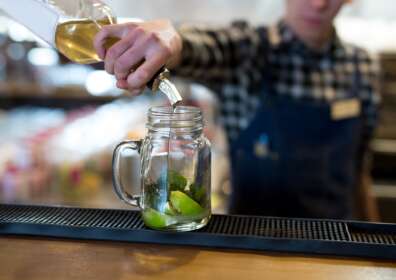Restaurant Liquor Licenses in Utah:
- For new locations, no variances from churches/schools/parks, even if there are other liquor licenses right next door (300/200 feet)
- Manager training never expires; server training expires every three years.
- No guests standing with alcohol.
- No purchased-ahead alcohol (e.g., wine pairing dinners can only be booked online for food, not alcohol).
- Local laws can be stricter than the state, but not looser!
Bar Liquor Licenses in Utah:
- For new locations, no variances from churches/schools/parks, even if there are other liquor licenses right next door (600/200 feet)
- Manager training never expires; server training expires every three years.
- No minors on premises, ever! Not even for private events.
- No purchased-ahead alcohol (e.g., wine pairing dinners can only be booked online for food, not alcohol).
- Local laws can be stricter than the state’s laws, but not looser!
Distillery Liquor Licenses in Utah:
- Utah is welcoming to manufacturers, and has manufacturing permits readily available.
- Advertising doesn’t have to be approved by the TTB, but it can be regulated. Including social media.
- Small craft manufacturers are eligible for federal tax reductions which became permanent in December 2020.
- You can apply for a special package agency (“Type 5”) permit, which allows you to sell your product directly from your facility.
- If you have a restaurant or bar attached to your distillery, you can sell your bottles out of your package agency on Sundays and holidays (when state stores are closed).
Brewery Liquor Licenses in Utah:
- Utah is welcoming to new breweries, and has manufacturing permits readily available.
- Small breweries in Utah are exempt from franchise laws.
- Small breweries in Utah (producing less than 60,000 barrels a year) may apply for a reduced price markup (32% rather than 88%).
- You can apply for a special package agency (“Type 5”) permit, which allows you to sell your product directly from your facility.
- If you have a restaurant or bar attached to your brewery, you can sell your bottles out of your package agency on Sundays and holidays (when state stores are closed).
Winery Liquor Licenses in Utah:
- Utah is welcoming to new wineries, and has manufacturing permits readily available.
- Small wineries in Utah (producing less than 20,000 gallons a year) may apply to the state for a reduced price markup (49% rather than 88%).
- You can apply for a special package agency (“Type 5”) permit, which allows you to sell your product directly from your facility.
- If you have a restaurant or bar attached to your distillery, you can sell your bottles out of your package agency on Sundays and holidays (when state stores are closed).
- Wineries are eligible to host tastings, but they have food and visibility restrictions.
Cidery Liquor Licenses in Utah::
- Utah is welcoming to new cideries, and has manufacturing permits readily available.
- Small cideries in Utah (producing less than 620,000 gallons a year) may apply for a reduced price markup (49% rather than 88%).
- You can apply for a special package agency (“Type 5”) permit, which allows you to sell your product directly from your facility.
- If you have a restaurant or bar attached to your distillery, you can sell your bottles out of your package agency on Sundays and holidays (when state stores are closed).
- Cideries are eligible to host tastings, but they have food and visibility restrictions.
Sale of a business and Liquor License in Utah:
- All businesses that make or sell alcohol must conduct a sale of the business through the state of Utah.
- You may buy or sell a Utah liquor license from the state or from an existing business.
- Bar licenses are the most popular licenses to sell and buy in Utah because their availability is limited by a population cap.
- Failure to have a management agreement in place during a transfer of a license can result in losing the license and putting the sale of the business at risk.
- Bar licenses are the only ones you can currently transfer in a sale from one county to move to another county.




1 Comment